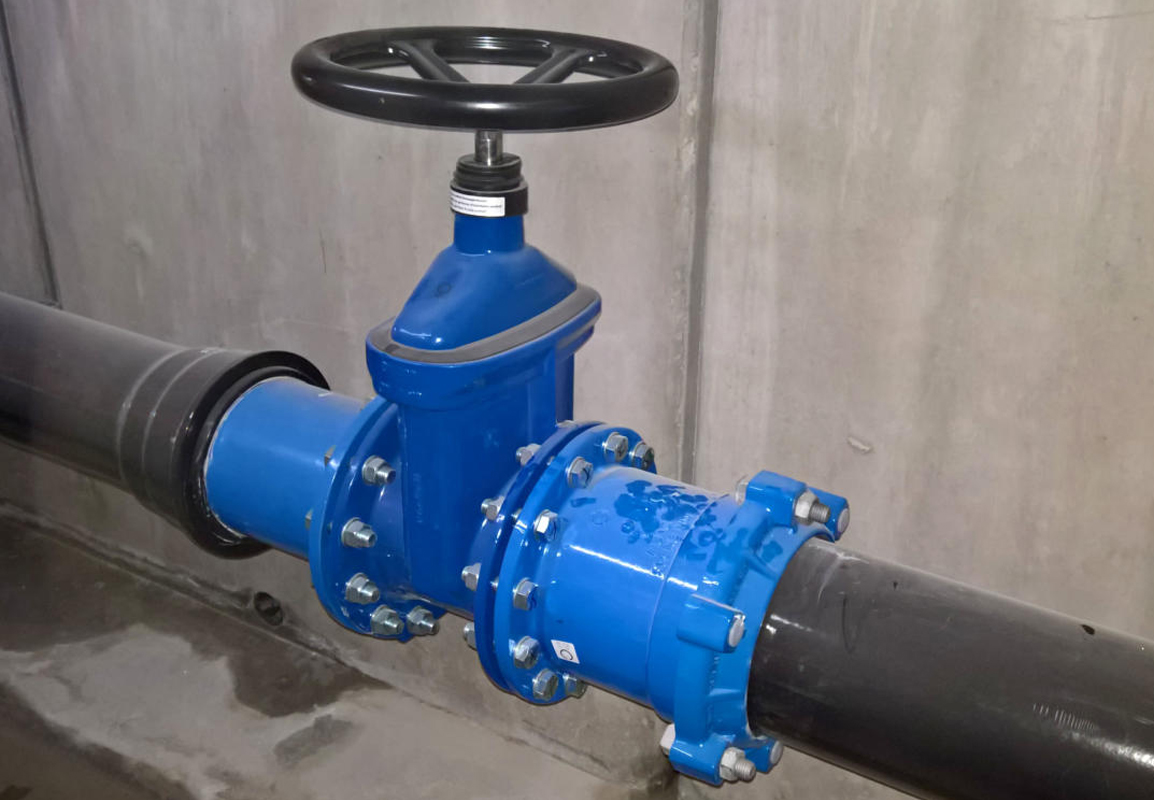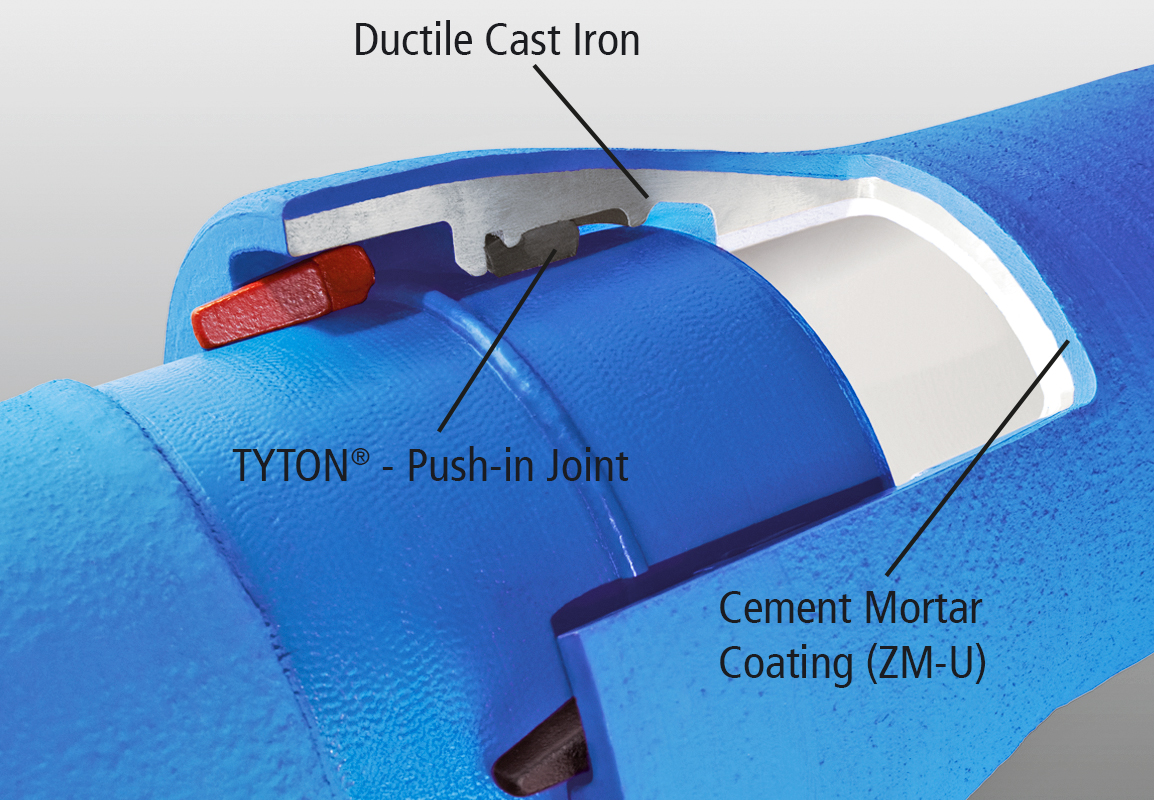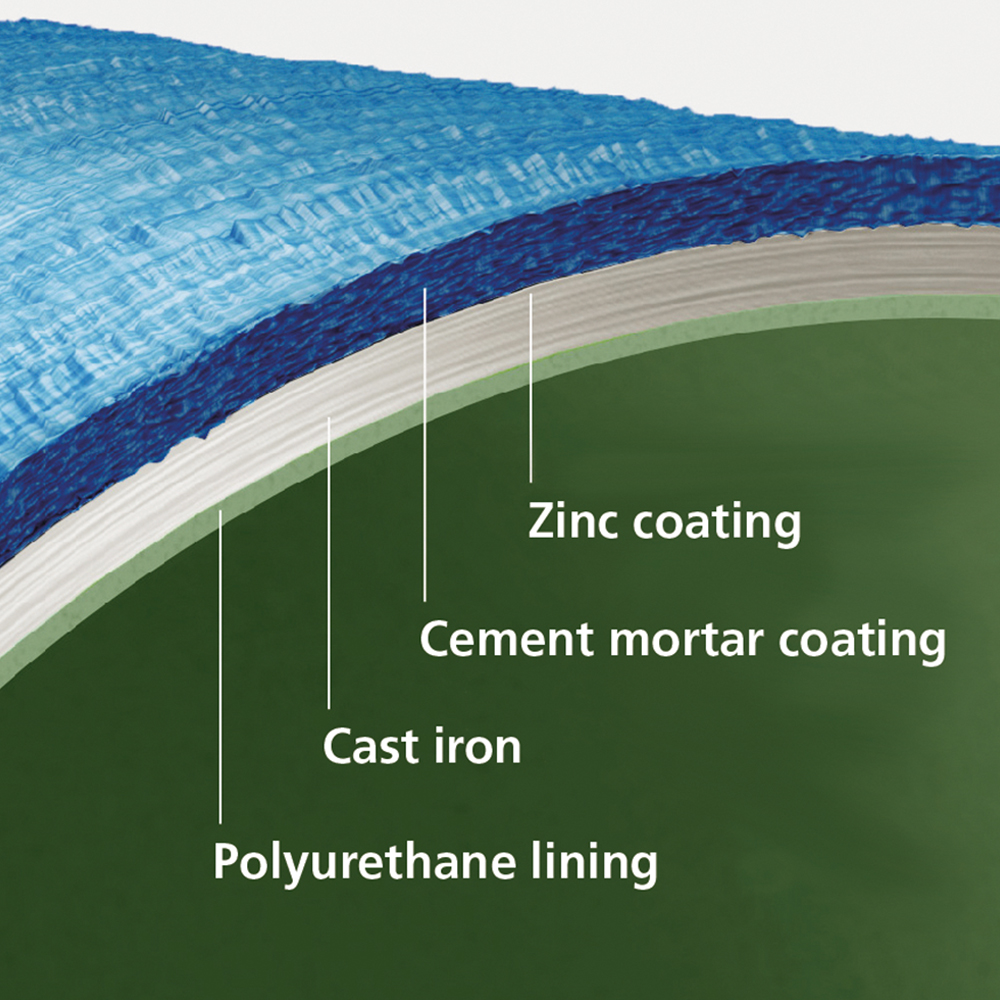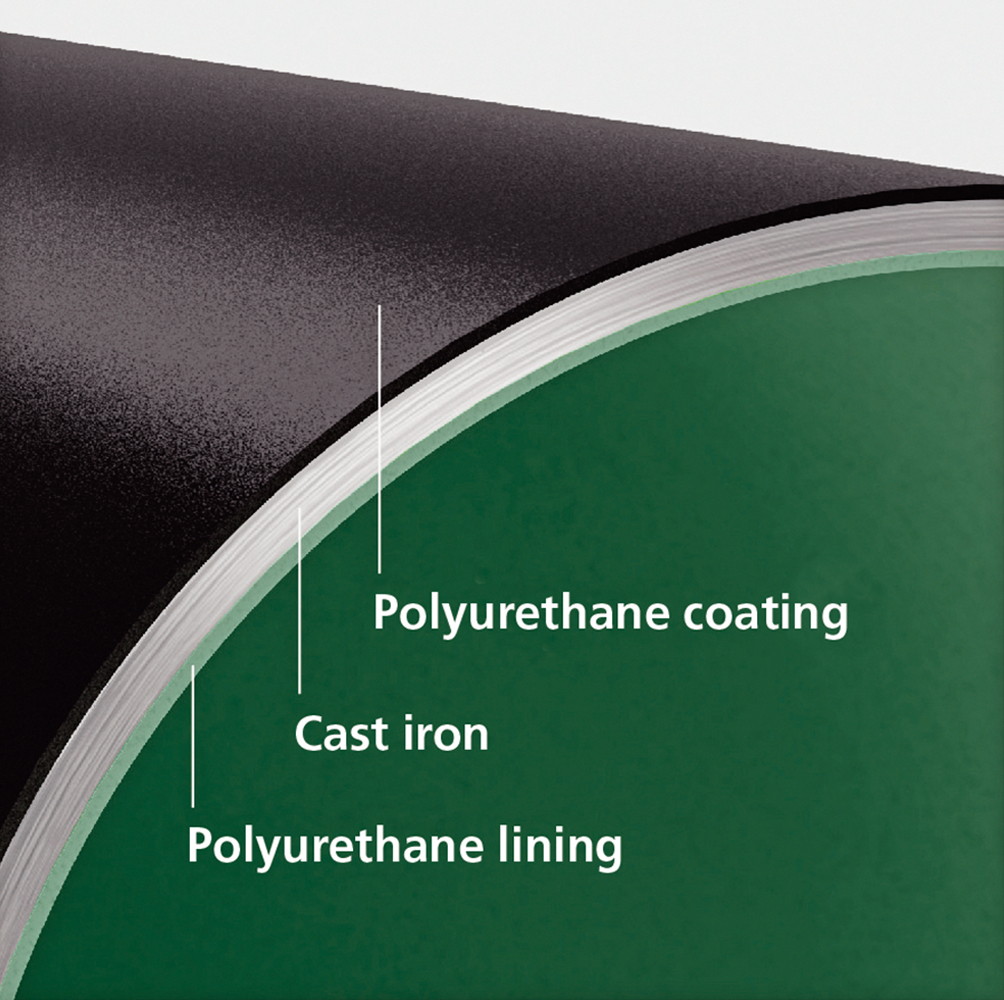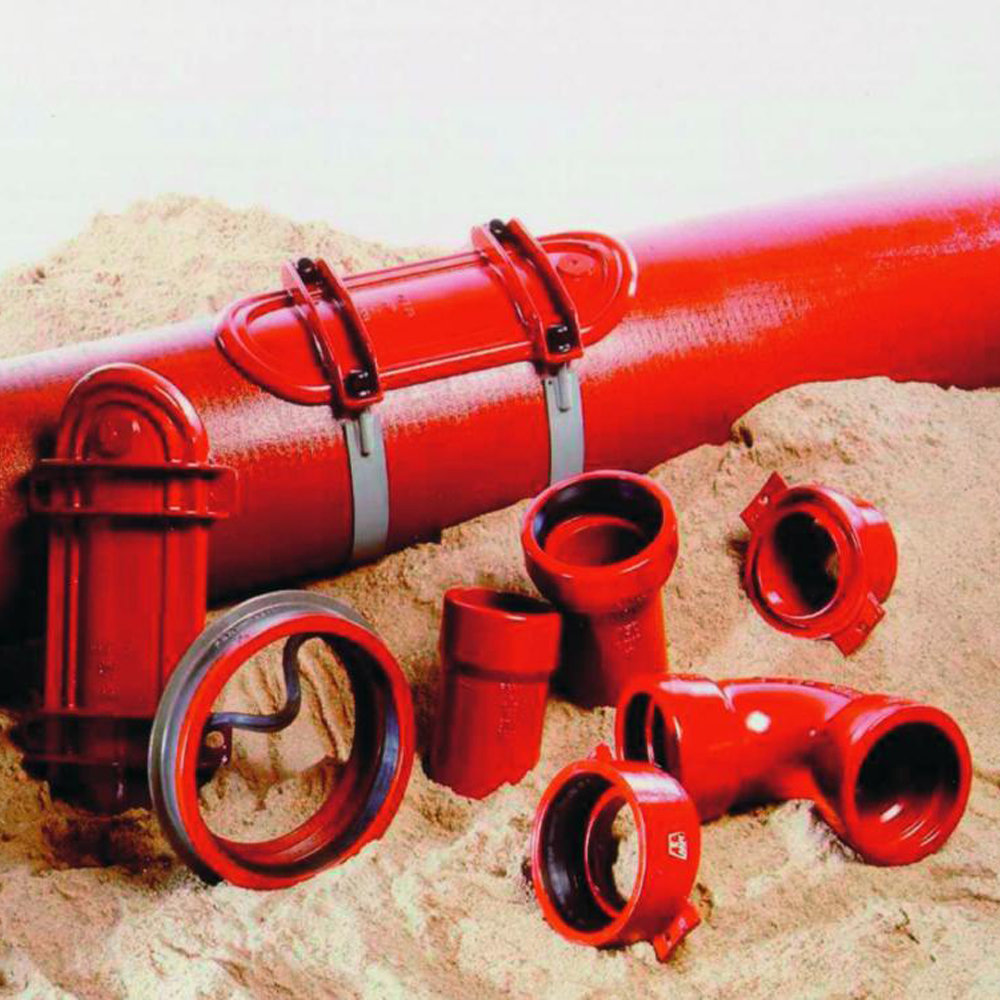Cast iron material
The main applications for ductile cast iron pipe systems are still in water supply and sewerage networks. With the increasing demand for pipe systems, e.g. for snow-making systems or pipelines for hydroelectric power stations in alpine regions, the applications for ductile cast iron pipes, fittings and valves have expanded. For all these applications, the same high demands are placed on the reliability and service life of the pipe system.
The right pipe for every bedding!
Characteristics
Pipes, valves and fittings made of ductile cast iron meet all the high requirements for a reliable, safe and durable transport system:
- hygienic (essential for the transport of drinking water)
- they are non-combustible
- ductile cast iron pipes are diffusion-tight
- ductile cast iron pipe systems can withstand pressures of up to 100 bar
- their excellent mechanical properties remain unchanged throughout their service life
- the pipe joints are simply plugged for high installation productivity and to facilitate installation in difficult terrain.
- the joints are not weak points in the pipe system and are even resistant to root ingrowth
- increased safety can be achieved through fracture-mechanical leak-before-break design
- ductile cast iron pipe systems offer system reserves in the event of natural disasters (e.g. earthquakes or washing out after heavy rainfall events)
- the service life of ductile cast iron pipe systems is in excess of 100 years
Internal and external protection
Factory applied coatings and linings provide permanent protection for ductile cast iron pipes, fittings and valves against internal and external mechanical and chemical attack. They allow ductile cast iron pipe systems to be used in most applications. Interactions with the environment are avoided by using suitable coatings for external protection or linings for internal protection. There are solutions to every internal and external impact that will ensure long service life.
Examples of coatings or linings include:
-
Zinc coating with top coat on pipes
-
Cement mortar coating of pipes
-
Polyethylene coating of pipes
-
Polyurethane coating of pipes
-
Cement mortar lining of pipes and fittings
-
Polyurethane coating of pipes
-
Epoxy resin lining and coating of fittings and valves
-
Technical enamel lining and coating of fittings and valves
EADIPS FGR member companies ensure the consistent high quality of their products through an active quality management system with external and internal monitoring.
Sustainability
Of course, sustainability criteria are also met by ductile cast iron pipe systems. Sustainable development taken into account:
economic aspects
Investment in ductile cast iron pipe systems pays for itself low installation and operating costs and an exceptionally long service life:
- High installation productivity due to socket joints → Reduced labour costs
- No welding required → Reduces labour costs
- Installation independent of weather conditions → Reduces labour costs
- Often no sand bed required → reduces material and logistics costs
- No concrete abutments required for shear-resistant connections → Reduces material and logistics costs
- Connections can be angled → saves on fittings
- Wide range of fittings and valves avoids customisation → Reduces material and labour costs
- Lowest damage rates → Reduces operating, energy, repair and maintenance costs
- Service life in excess of 100 years → Minimises refurbishment budgets
ecological aspects
Ductile cast iron pipe systems are proven to deliver true environmental sustainability:
- Diffusion tightness → protects drinking water in all soil and installation conditions from environmentally harmful hydrocarbons and groundwater during wastewater transport
- Food-safe liners → ensure the hygienic and ecological transport of drinking water
- Scrap as a raw material → minimises the consumption of primary and fossil resources and reduces CO2 emissions
- Ductile cast iron is recyclable and can be reused → conserves resources for present and future generations
- Low maintenance and service costs with a long service life → avoids waste, minimises resource consumption and reduces CO2 emissions
social aspects
The high technical performance and top quality of ductile iron pipe systems (in accordance with the requirements of the quality guidelines) guarantee safety and reliability. At the highest level in all areas of water management and for generations to come:
- High material strength → allows operating pressures of up to 100 bar
- Durable external protection → resists mechanical and chemical attack, extending service life
- Static load capacity → allows maximum transverse and longitudinal loads with increasing traffic loads
- Connection → allows operating pressures of up to 100 bar, is root resistant and therefore suitable forin the sponge city
- Ductile cast iron → is non-combustible
- Extremely long service life over generations
- Restrained joints → allow for maximum tensile forces and are therefore ideal for trenchless installation
- Superior material properties → enable special applications in alpine regions, for fire-fighting pipelines, snow-making systems and hydroelectric power stations
DVGW damage statistics: ‚Ductile cast iron pipes are very safe‘
Ductile cast iron pipes are particularly suitable for the transport and distribution of drinking water. One of the most important tasks of our civilisation is to ensure that water, the most important resource on our planet, always reaches its destination. Above all, however, the safety of the pipe system must be ensured. According to the DVGW damage statistics (2020), ductile iron pipes are the safest pipes used in drinking water networks. As the pipe systems are diffusion-tight, no harmful substances can enter the drinking water from outside. Of course, the same properties also ensure that ductile iron sewers are considered particularly safe, as no wastewater can escape. Ductile cast iron drinking water pipes can therefore be used in parallel with sewers or even in polluted or contaminated areas.
From pipe to soil to soil to pipe system
Ductile cast iron pipe systems are often used as a problem solver in adverse conditions. The reasons for this are high longitudinal bending strength, good flexural rigidity, variable socket joints and user-oriented external coatings, which in many cases allow in-situ soil to be reused. For example, up to 100 mm of broken material in the trench is no problem for ductile cast iron pipes, which are coated, for example, with a layer of cement mortar to protect them from external mechanical impact. This allows network operators to use the resource of soil sparingly. This soil-pipe system differs from the usual pipe-soil system, in which the soils have to be selected or modified to ensure optimum and damage-free bedding of the wastewater and drinking water pipes.

